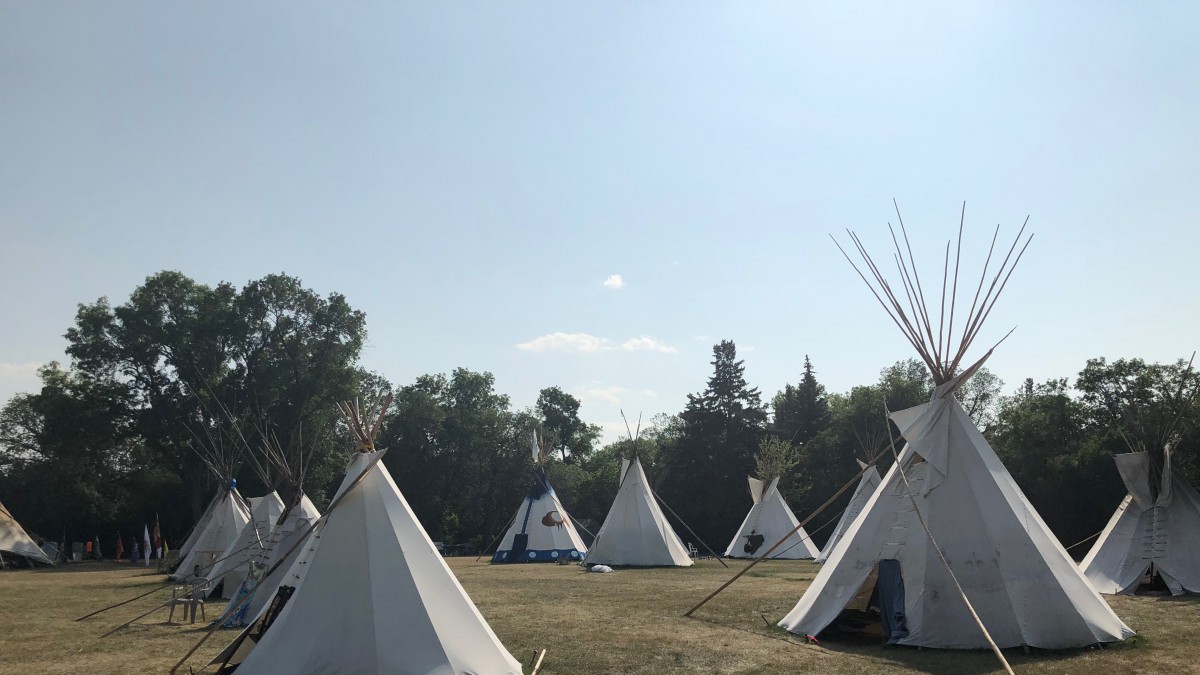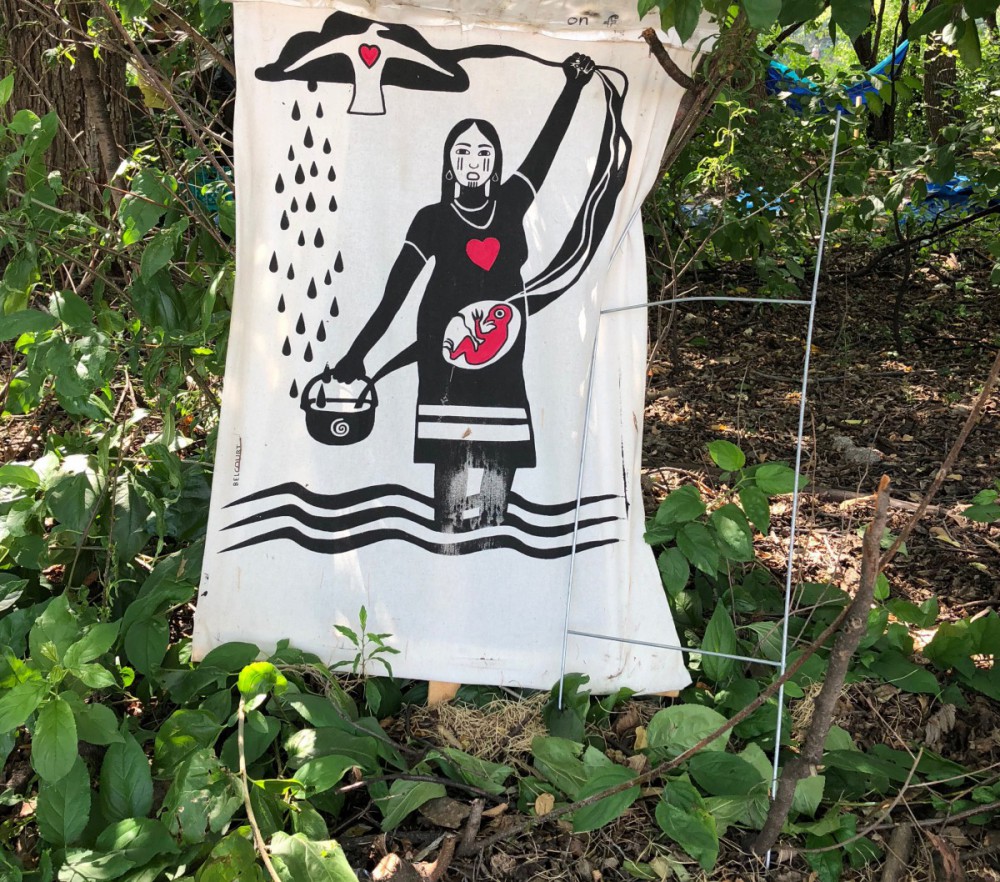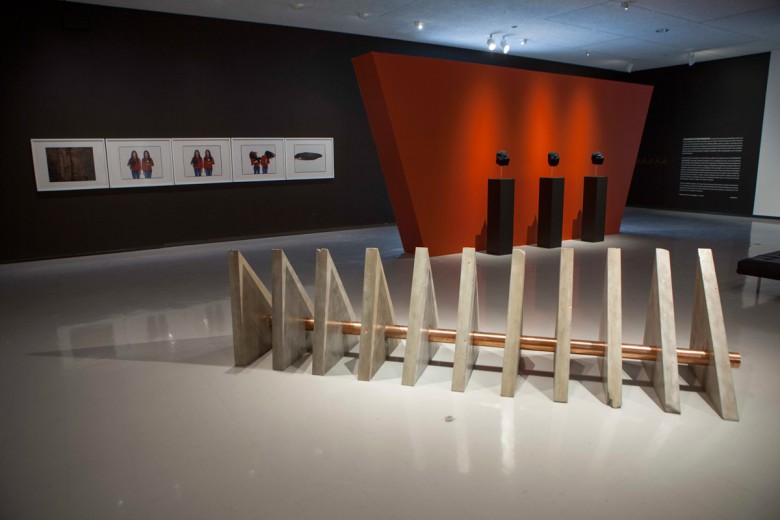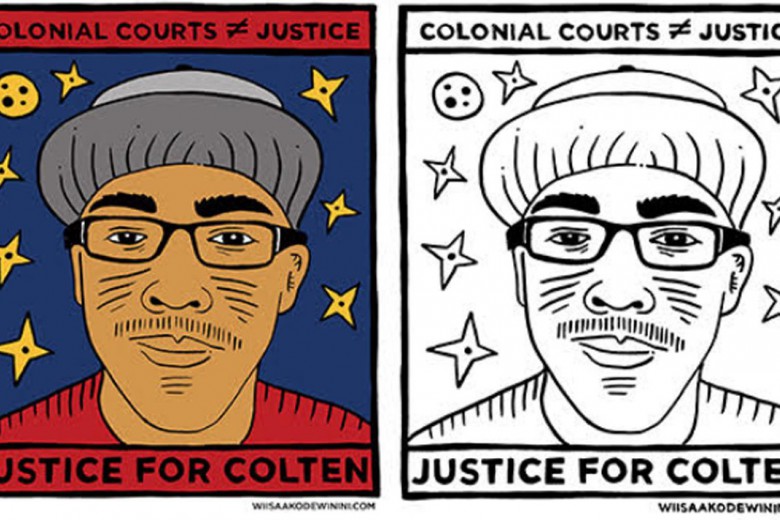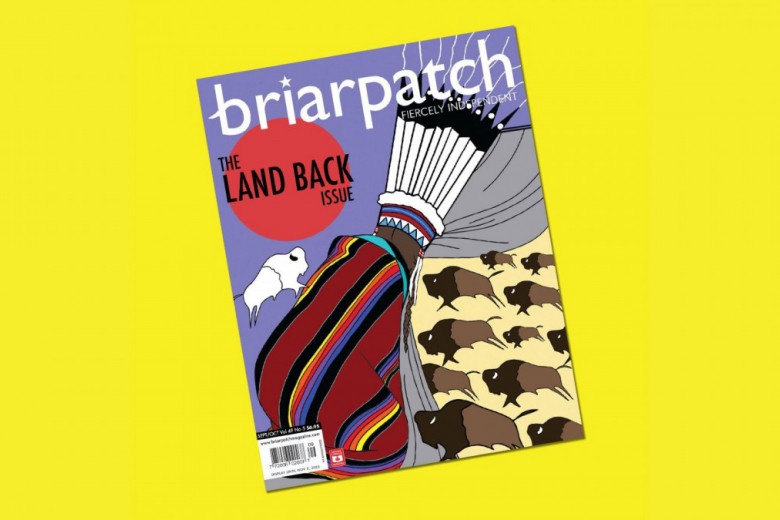We are defined by the federal government according to numbers and blood. We are defined by society according to stereotypes. And as we grapple with the legacy of colonization and seek to excise the colonization within ourselves, defining our own identities becomes a political struggle. Indigenous identity is a complicated thing.
But there is a sort of liberation that occurs when we come together and sit amongst each other, when all of the colonized world seems to disappear. It is why I find myself at the camp, or at any other Indigenous event or rally.
I met with Chasity Delorme and Prescott Demas at Camp: Justice For Our Stolen Children, which has been standing in front of Saskatchewan’s provincial legislature on Treaty 4 territory since February. Most of the mainstream news coverage – largely by settlers – has been sensational and sensationalized: images of cops dragging kohkoms out of the tipi, or armed neo-Nazis marching around the camp throwing salutes. But it’s a far cry of what the camp really is: a place of healing and resurgence.
But there is a sort of liberation that occurs when we come together and sit amongst each other, when all of the colonized world seems to disappear.
When I spoke to Chasity and Prescott about how we could write about the camp to show the daily work of decolonization that happens there, we agreed that I would share the campers’ stories and capture the spirit and intent of the camp – to show that the camp is a community, and that Indigenous identity is communal.
The trauma that was inflicted by residential schools is still happening today. It’s carried between generations, and the root causes haven’t been addressed, only renamed. Through the use of prisons and the child welfare system, Indigenous children and families are still subject to colonial control and harm. This was where much of my conversation with Chasity led. When I met with Chasity it was the day after the camp held a memorial and feast for Colten Boushie, on the two-year anniversary of his murder.
What made you, personally, come to the camp?
Chasity: Well, my DNA. I believe, from a spiritual perspective, my ancestors, they live within my blood. And they’re hurting, because we’re suffering in this colonial world. And there are some of us that can’t help but to listen to that call to be okihcitâw iskwêw – warrior men and women – and we have to honour that, because we really don’t have a choice. Otherwise our people will continue to die and continue to suffer. And so it’s in my blood to do the work that I’m doing.
Do you think that there are conflicting worldviews between people here at the camp and the people who are inside the legislature?
Chasity: Totally conflicting worldviews because a lot of the folks – even the new generation of government leaders that are coming in – are coming in from very privileged lives. […] They don’t have any idea of what it’s like to be an Indigenous person. So, what they see is the normal. What they see is by-laws are being broken, [and they respond by saying] “This cannot happen!” There is no empathy towards Indigenous people [who] are dying.
Last time we spoke you mentioned the interconnectedness between the camp and the systems [you’re protesting] and Indigenous identity. Can you elaborate more on your view of this?
We have a lot of Indigenous people, obviously, at this camp – some that understand their identity, and a lot that don’t. And some that are just learning. And when it boils down to the spirit and the intent of this camp […] it’s about the children. And our children – we’re taught as Indigenous people – are gifts from the Creator. And they’re only loaned to us to care for in this physical world. And so when I talk about interconnectedness I mean the spirituality part that isn’t always acknowledged, but is very much there.
“And there are some of us that can’t help but to listen to that call to be okihcitâw iskwêw – warrior men and women – and we have to honour that, because we really don’t have a choice.”
So, when you draw a picture of the different stages of life, our children are in that. You have our infants, then the children, and adolescents, then adult, then grandmother, then death, and then the cycle keeps going. And, in this camp, there are people who represent that entire cycle of life.
Whether we realize it or not, we are acknowledging that belief that children are only loaned to us and we must protect them. So that’s where the interconnectedness part comes in. Because we are protecting a very important cycle of life – ‘cause if our children keep dying and our people keep dying, that cycle may end one day.
When you look at each part of what this resistance stands for, […] it all boils down to: we are all children, we are all children of the Creator. And that’s another perspective of “No more stolen children,” because as Indigenous people we are being stolen from this earth. And this earth as our mother who provides all we’re being taken from here. We are being taken from our own mothers of whose wombs we’re grown.
There’s a picture at the front [of the camp] that shows the mother with the womb and with the water, and so if you look at the rest of the [Indigenous] resistances that are happening – the people who are protecting the water – all people see is “Oh they’re against pipelines,” but there’s a reason for that. There’s a deeper spiritual meaning as to why there’s other Indigenous resistance happening. They’re protecting the water – the water […] that grows human beings, the water of which we are made, the water that grows these little people in our wombs that then we gave birth to and then we are to protect them.
***
It was a hot morning when I met with Prescott; bags of ice were sweating in the coolers. There were very few people at the camp. Near the food supply tent a pitbull named Tater was tied to a tree, and barked the whole interview.
Do you think that some settlers don’t want to acknowledge the truth that they benefit from the oppression of indigenous people, or the truth that we’re all treaty people with obligations? If so, why?
Prescott: Because it affects where they [settlers] are in life right now, they dont look at it as us needing equality – they look at it as them as losing power. I like to think […] that they fear the oppressed will become the oppressors. That they have an understanding of what they’ve done to us, so they fear they will lose power and be in the situation we are in.
“It affects where they [settlers] are in life right now, they dont look at it as us needing equality – they look at it as them as losing power.”
So, you think that they do know the truth, and that they don’t want to admit [that] truth.
Prescott: Yes, because they stand to lose [something]. Those are the ones that fear. […] They fear they’re going to lose their little bit of privilege – […] their privilege that allowed them to sit up in their perch high up in that hierarchy.
Do you think that some people are scared to come here [to the camp] and voice opposition? Would you welcome those voices?
Prescott: Oh yes, I know they’re scared. They’re only scared because they don’t know and they don’t understand what this is. Instead they understand the stereotypes they’ve grown up with: that Indians are violent and we’re lazy and alcoholics and criminals – all those things. And that’s what society taught them and that’s what they’re scared of. But I do welcome that, and I hope not that I can change their mind but that they would allow themselves to take in that bit of information that I have and continue to research Canada’s true history with the Indigenous population and change their own mind.
“They’re only scared because they don’t know and they don’t understand what this is. Instead they understand the stereotypes they’ve grown up with: that Indians are violent and we’re lazy and alcoholics and criminals – all those things.”
Who do you think is the most harmed from the child welfare system?
Prescott: The child. Especially when you do things like taking the child right out of the hospital to prevent that bonding process [with their parent], you’re getting that child more lost by [doing that].
[He is talking about the birth alert that child welfare agencies practice, which places mothers onto a watch list when they’ve previously had their children taken away, or if there’s any other potential cause for concern.]
Do you think that the parents and the community are affected as well?
Prescott: Yeah, definitely. Especially if those parents themselves grew up in that foster care or prison system. You look at where they are, and you look what is available to them should their child be taken away: nothing but grief and sadness, and they only have to open the door to a readily available supply of drugs and alcohol.


